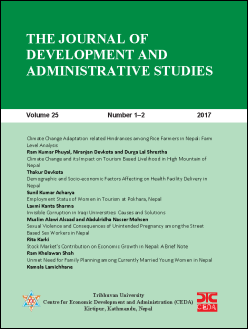Climate Change Adaptation related Hindrances among Rice Farmers in Nepal: Farm Level Analysis
DOI:
https://doi.org/10.3126/jodas.v25i1-2.23434Keywords:
Climate Change Adaptation, Barriers, Rural Rice Farmers, Way forward, NepalAbstract
The objective of this study is to measure the hindrances of climate change adaptation among rural rice farmers in Nepal and its possible way forward. This study was done in seven districts, one district from each of seven provinces, where three from Terai region (i.e. Bara, Dang and Kailali) and four from Hilly region (i.e. Ilam, Sindhuli, Syangja and Surkhet) of Nepal. A structural questionnaire with both closed and open - ended questions were prepared and used to obtain required information from 773 rice farming households from the targeted study areas. Interviews were conducted for the crop year 2016 and for the main season rice cultivation in Nepal covering from June/July to October/November of each year (i.e., monsoonal cultivation of paddy). Results show that, factors such as inadequate operational capital, poor access to weather forecast and climate change information, inadequate awareness program on climate change from government and non-government agencies are the major barriers for over 90 percent of the farmers surveyed by this study. Similarly, about 80 percent of the sample surveyed farmers opined that high cost of improving seeds, fertilizers and irrigation, inadequate knowledge on coping mechanism or in building resilience and inadequate access to credit facilities are the major hindrances to them for addressing weather and Climate Change (CC) related vagaries. Hence, the empirical results drawn from this study suggest that there is an urgent need in Nepal for greater investment at agrarian sector to address these farmers’ level constraints and including supports for improving access to market and credit issues to farmers ( institutional and policy supports). Poor and ultra-poor farmers are more vulnerable from the vagaries of climate change, thereby immediate actions are needed from Ministry of Agriculture, and newly set up local government units in terms of more public investments at local and national level to enhance the climate change resilience of smallholding and poor farmers of Nepal.
Downloads
Downloads
Published
How to Cite
Issue
Section
License
The copyright of the accepted articles is reserved by the Centre for Economic Development and Administration (CEDA), Tribhuvan University (TU). No part of the article published in this journal should be reproduced except provided by the law currently in force without the written consent of the centre.




